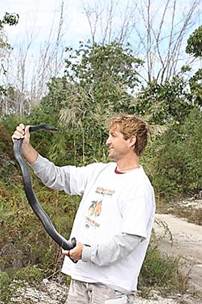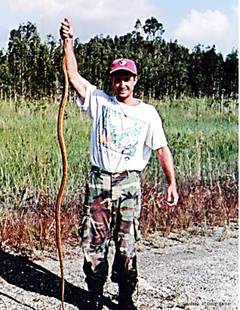
Name Dr. Kenneth Krysko
- Education PhD. Wildlife Ecology and Conservation, University of Florida, M.S. Biological Sciences, Florida International University; B.S. Biological Sciences, Florida State University
- Target Audience Middle School

What lurks in the sewers of New York City? Rats, sure...but, alligators? Dr. Krysko, Herpetologist was asked just that recently on an episode of MonsterQuest. When he's not helping with NYC's alligator problem, Dr. Krysko teaches herpetology;and invasion ecology courses at the University of Florida, and manages the amphibian and reptile collection at the Florida Museum of Natural History, which now includes the largest python ever caught in the Everglades. Read more to find out what makes herpetology such a cool job!
I am a herpetologist, so I do research and teaching about amphibians and reptiles.
I have always had a passion for amphibians and reptiles
No two days are exactly the same, you never know what will come through the door and it's very exciting at times. One day it can be a common lizard, another day it can be a large rattlesnake, other days it's just another student asking for help on a project.
The freedom it affords me and I get to travel to exotic places.
I always excelled in science and math. I loved any class that dealt with animals.
It was in high-school when I learned people actually got paid to do such things.
Staying in school my entire life.
 field?
field? Dr. Roy Crabtree, who is a fish biologist. I was very passionate about game fish such as tarpon and Dr. Crabtree contacted me about taking him to some of my secret fishing spots for his research on juvenile tarpon. That's when I first learned there were jobs for people who didn't want to sit behind a desk all day - for me that would be miserable.
All science and math courses are helpful if you're pursuing herpetology.
Assist a scientist to gain experience and have as much fun as possible.
Always! Scientists are always making new discoveries. Recently, we collected the largest python to ever be caught in the wild.
(adapted from flmnh.com)
Amphibian - a cold-blooded vertebrate animal; frog, toads
Antivenin - product used in the treatment of poisonous bites or stings
Carnivorous - meat-eating, ability to digest meat
Herpetology - the branch of zoology concerned with reptiles and amphibians
Reptile - a cold-blooded vertebrate animal; snakes, crocodiles
Tarpon - a large tropical marine fish
Venomous - poisonous
(adapted from dictionary.com)
How do we make sure that certain reptiles do not become extinct and mak…
Do you love the outdoors? Do you love the wildlife and finding out more…
Are you really interested in the lives and life cycle of reptiles and a…